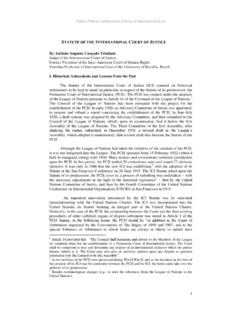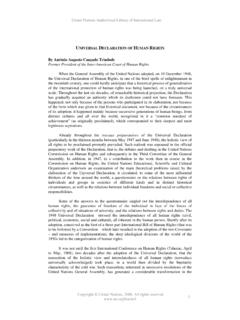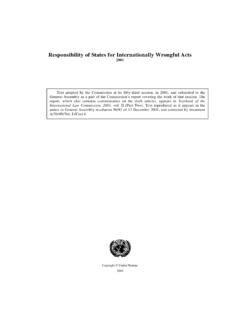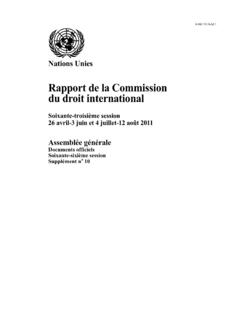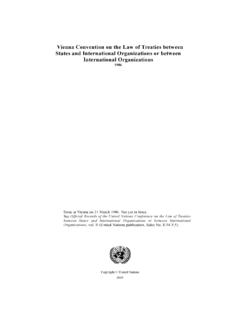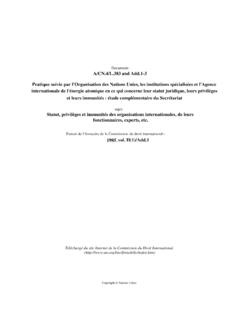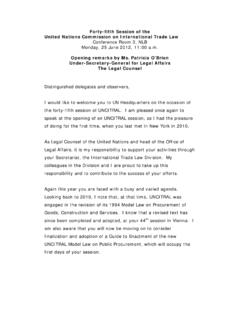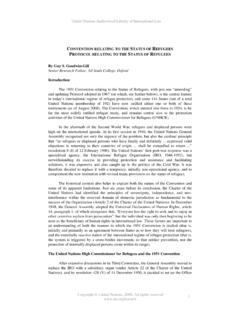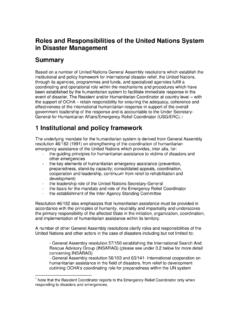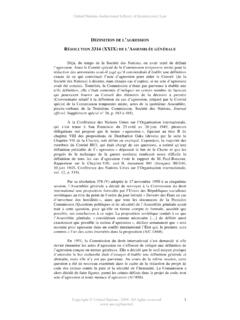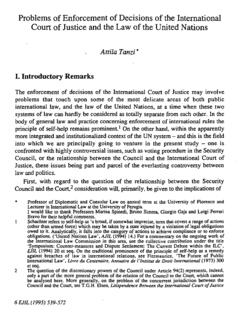Transcription of STATUTE OF THE INTERNATIONAL COURT OF …
1 STATUTE OF THE INTERNATIONAL COURT OF JUSTICEA rticle 1 INTERNATIONAL COURT OF justice estab-lished by the Charter of the United Nations asthe principal judicial organ of the United Nationsshall be constituted and shall function in accord-ance with the provisions of the present IORGANIZATION OF THE COURTA rticle 2 The COURT shall be composed of a body of inde-pendent judges, elected regardless of their nation-ality from among persons of high moral character,who possess the qualifications required in their re-spective countries for appointment to the highestjudicial offices, or are jurisconsults of recognizedcompetence in INTERNATIONAL 31. The COURT shall consist of fifteen members,no two of whom may be nationals of the same , A person who for the purposes of member-ship in the COURT could be regarded as a nationalof more than one state shall be deemed to be anational of the one in which he ordinarily exercisescivil and political 41.
2 The members of the COURT shall be electedby the General Assembly and by the SecurityCouncil from a list of persons nominated by thenational groups in the Permanent COURT of Arbitra-tion, in accordance with the following In the case of Members of the United Na-tions not represented in the Permanent COURT ofArbitration, candidates shall be nominated bynational groups appointed for this purpose bytheir governments under the same conditions asthose prescribed for members of the PermanentCourkof Arbitration by Article 44 of the Conven-tion of The Hague of 1907 for the pacific settle-ment of INTERNATIONAL The conditions under which a state whichis a party to the present STATUTE but is not a Mem-ber of the United Nations may participate in elect-ing the members of the COURT shall, in the absenceof a special agreement, be laid down by the Gen-eral Assembly upon recommendation of the Se-curity 51.
3 At least three months before the date of theelection, the Secretary-General of the UnitedNations shall address a written request to themembers of the Permanent COURT of Arbitrationbelonging to the states which are parties to thepresent STATUTE , and to the members of the na-tional groups appointed under Article 4, para-graph 2, inviting them to undertake, within a giventime, by national groups, the nomination of per-sons in a position to accept the duties of a memberof the No group may nominate more than four per-sons, not more than two of whom shall be of theirown nationality. In no case may the number ofcandidates nominated by a group be more thandouble the number of seats to be 6 Before making these nominations, each nationalgroup is recommended to consult its highest courtof justice , its legal faculties and schools of law, andits national academies and national sections of in-ternational academies devoted to the study of 71.
4 The Secretary-General shall prepare a list21in alphabetical order of all the persons thus nomi-nated. Save as provided in Article 12, paragraph2, these shall be the only persons The Secretary-General shall submit this listto the General Assembly and to the 8 The General Assembly and the Security Coun-cil shall proceed independently of one another toelect the members of the 9At every election, the electors shall bear in mindnot only that the persons to be elected should in-dividually possess the qualifications required, butalso that in the body as a whole the representationof the main forms of civilization and of the prin-cipal legal systems of the world should be 101. Those candidates who obtain an absolutemajority of votes in the General Assembly and inthe Security Council shall be considered as Any vote of the Security Council, whetherfor the election of judges or for the appointmentof members of the conference envisaged in Article12, shall be taken without any distinction betweenpermanent and non-permanent members of theSecurity In the event of more than one national of thesame state obtaining an absolute majority of thevotes both of the General Assembly and of theSecurity Council, the eldest of these only shall beconsidered as 11If, after the first meeting held for the purposeof the election, one or more seats remain to befilled, a second and, if necessary.
5 A third meetingshall take 121. If, after the third meeting, one or more seatsstill remain unfilled, a joint conference consistingof six members, three appointed by the GeneralAssembly and three by the Security Council, maybe formed at any time at the request of either theGeneral Assembly or the Security Council, for thepurpose of choosing by the vote of an absolutemajority one name for each seat still vacant, tosubmit to the General Assembly and the SecurityCouncil for their respective If the joint conference is unanimously agreedupon any person who fulfils the required condi-tions, he maybe included in its list, even thoughhe was not included in the list of nominations re-ferred to in Article If the joint conference is satisfied that it willnot be successful in procuring an election, thosemembers of the COURT who have already beenelected shall, within a period to be fixed by theSecurity Council, proceed to fill the vacant seatsby selection from among those candidates whohave obtained votes either in the General Assem-bly or in the Security In the event of an equality of votes amongthe judges, the eldest judge shall have a 131.
6 The members of the COURT shall be electedfor nine years and may be re-elected; provided,however, that of the judges elected at the first elec-tion, the terms of five judges shall expire at the endof three years and the terms of five more judgesshall expire at the end of six The judges whose terms are to expire at theend of the above-mentioned initial periods of threeand six years shall be chosen by lot to be drawnby the Secretary-General immediately after thefirst election has been The members of the COURT shall continue to22discharge their duties until their places have beenfilled. Though replaced, they shall finish any caseswhich they may have In the case of the resignation of a memberof the COURT , the resignation shall be addressed tothe President of the COURT for transmission to theSecretary-General.
7 This last notification makes theplace 14 Vacancies shall be filled by the same method asthat laid down for the first election, subject to thefollowing provision : the Secretary-General shall,within one month of the occurrence of the vacancy,proceed to issue the invitations provided for inArticle 5, and the date of the election shall be fixedby the Security 15A member of the COURT elected to replace amember whose term of office has not expired shallhold office for the remainder of his predecessor' 161. No member of the COURT may exercise anypolitical or administrative function, or engage inany other occupation of a professional Any doubt on this point shall be settled bythe decision of the 171. No member of the COURT may act as agent,counsel, or advocate in any No member may participate in the decisionof any case in which he has previously taken partas agent, counsel, or advocate for one of the par-ties, or as a member of a national or internationalcourt, or of a commission of enquiry, or in anyother Any doubt on this point shall be settled bythe decision of the 181.
8 No member of the COURT can be dismissedunless, in the unanimous opinion of the othermembers, he has ceased to fulfil the required Formal notification thereof shall be made tothe Secretary-General by the This notification makes the place 19 The members of the COURT , when engaged onthe business of the COURT , shall enjoy diplomaticprivileges and 20 Every member of the COURT shall, before takingup his duties, make a solemn declaration in opencourt that he will exercise his powers impartiallyand 211. The COURT shall elect its President and Vice-President for three years; they may be The COURT shall appoint its Registrar andmay provide for the appointment of such otherofficers as may be 221. The seat of the COURT shall be established atThe Hague.
9 This, however, shall not prevent theCourt from sitting and exercising its functionselsewhere whenever the COURT considers it The President and the Registrar shall resideat the seat of the 231. The COURT shall remain permanently insession, except during the judicial vacations,the dates and duration of which shall be fixedby the Members of the COURT are entitled to peri-23odic leave, the dates and duration of which shallbe fixed by the COURT , having in mind the distancebetween The Hague and the home of each Members of the COURT shall be bound, un-less they are on leave or prevented from attending" by illness or other serious reasons duly explainedto the President, to hold themselves permanentlyat the disposal of the 241.
10 If, for some special reason, a member of theCourt considers that he should not take part in thedecision of a particular case, he shall so inform If the President considers that for some spe-cial reason one of the members of the COURT shouldnot sit in a particular case, he shall give him If in any such case the member of the Courtand the President disagree, the matter shall besettled by the decision of the 251. The full COURT shall sit except when it is ex-pressly provided otherwise in the present Subject to the condition that the number ofjudges available to constitute the COURT is notthereby reduced below eleven, the Rules of theCourt may provide for allowing one or more judges,according to circumstances and in rotation, to bedispensed from A quorum of nine judges shall suffice to con-stitute the 261.
